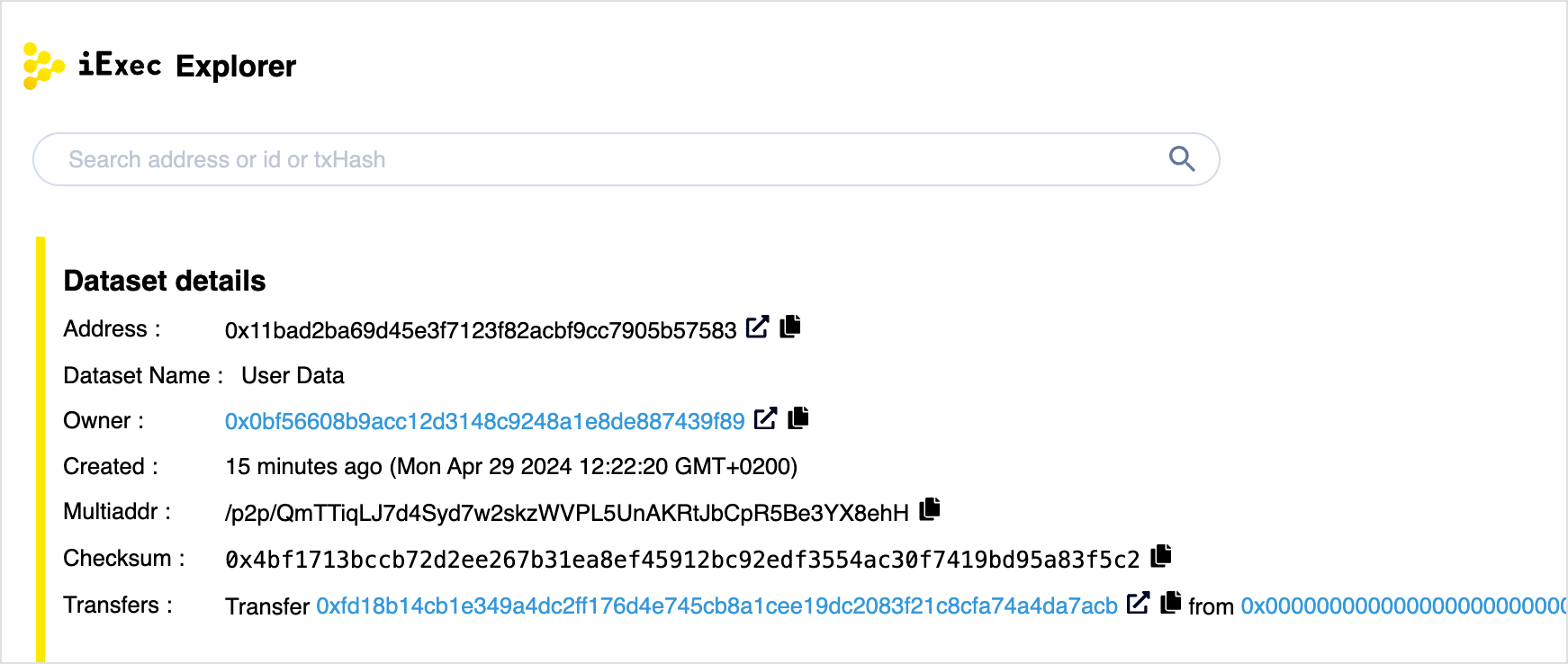protectData
The iExec tool suite supports deployment of applications where the user of the application has complete and total control over access to their data. This ensures privacy and security when invoking these applications.
Through use of the protectData method, a user may encrypt and secure any type of data. Encryption occurs on the client side, supporting the user's control over their data.
Usage
The method accepts a JSON object containing the data to encrypt and an optional name to identify the data.
An email address, for example, may be submitted as:
const protectedData = await dataProtectorCore.protectData({
data: {
email: 'example@gmail.com',
},
});Your object may contain any number of custom keys. The following example illustrates protection of multiple categories of data within one object:
const protectedData = await dataProtectorCore.protectData({
data: {
email: 'example@gmail.com',
SMTPserver: {
port: 5000,
smtp_server: 'smtp.gmail.com',
},
},
});INFO
🧪 While protected data are processed in TEE by intel SGX technology by default, @iexec/dataprotector can be configured to create and process protected data in the experimental intel TDX environment.
TDX mode is enabled by setting connecting the TDX SMS and using the TDX workerpool.
import { IExecDataProtectorCore } from '@iexec/dataprotector';
const web3Provider = window.ethereum;
// Instantiate dataProtector connected to the TDX SMS
const dataProtectorCore = new IExecDataProtectorCore(web3Provider, {
iexecOptions: {
smsURL: 'https://sms.labs.iex.ec',
},
});
// create a protected data
const protectedData = await dataProtectorCore.protectData({
data: {
email: 'example@gmail.com',
SMTPserver: {
port: 5000,
smtp_server: 'smtp.gmail.com',
},
},
});⚠️ Keep in mind: TDX mode is experimental and can be subject to instabilities or discontinuity.
Parameters
import { type ProtectDataParams } from '@iexec/dataprotector';data
Type: DataObject
This is the actual data the user is protecting, provided as a JSON object with any number of custom keys. The data is encrypted and stored as an NFT.
const protectedData = await dataProtectorCore.protectData({
data: {
email: 'example@gmail.com',
},
});TIP
If you'd like to protect a file, you first need to convert it to some kind of buffer. To do so, you can use createArrayBufferFromFile.
import { createArrayBufferFromFile } from '@iexec/dataprotector';
const fileAsArrayBuffer = await createArrayBufferFromFile(file);TIP
If you want to protect an Array, you must represent it as a Record<string, any>. To do so, you can use the reduceArray method implemented in this example.
const reduceArray = (array: Array<any>): Record<string, any> =>
array.reduce((accumulator, current, i) => {
accumulator[i] = current;
return accumulator;
}, {});
const emailsArray = [
'example@gmail.com',
'example@my-company.com',
'example@example.com',
];
const protectedData = await dataProtectorCore.protectData({
data: {
emails: reduceArray(emailsArray),
},
});
/**
* protectedData.schema:
* {
* emails: {
* 0: 'string',
* 1: 'string',
* 2: 'string'
* }
* }
*/name
Type: string
Default: ''
Allows providing a descriptive name for the protected data. This is considered public metadata, describing the protected data.
const protectedData = await dataProtectorCore.protectData({
name: 'myEmail',
data: {
email: 'example@gmail.com',
},
});TIP
The name is public and not encrypted.
uploadMode
Type: "ipfs" | "arweave"
Default: "ipfs"
Specify the storage solution to use for the protected data encrypted payload hosting.
const protectedData = await dataProtectorCore.protectData({
name: 'myEmail',
data: {
email: 'example@gmail.com',
},
uploadMode: 'arweave',
});allowDebug
Type: boolean
Default: false
Allow using the protected data in TEE debug apps.
const protectedData = await dataProtectorCore.protectData({
name: 'myEmail',
data: {
email: 'example@gmail.com',
},
allowDebug: true,
});TIP
This param is for development only.
onStatusUpdate
Type: OnStatusUpdateFn<ProtectDataStatuses>
Callback function to be notified at intermediate steps.
const protectedData = await dataProtectorCore.protectData({
name: 'myEmail',
data: {
email: 'example@gmail.com',
},
onStatusUpdate: ({ title, isDone }) => {
console.log(title, isDone);
},
});You can expect this callback function to be called with the following titles:
'EXTRACT_DATA_SCHEMA';
'CREATE_ZIP_FILE';
'CREATE_ENCRYPTION_KEY';
'ENCRYPT_FILE';
'UPLOAD_ENCRYPTED_FILE';
'DEPLOY_PROTECTED_DATA';
'PUSH_SECRET_TO_SMS';Once with isDone: false, and then with isDone: true
Return Value
import type {
ProtectedDataWithSecretProps,
ProtectedData,
} from '@iexec/dataprotector';The protectData method returns the following fields, as a JSON object.
name
string
The optional name provided during invocation of the method. If no name is specified this value defaults to Untitled.
address
Address
The ETH address of the newly created protectedData.
owner
Address
The ETH address of the creator and owner of this protectedData.
schema
DataSchema
Metadata describing the fields provided in the data parameter. The data types are automatically detected and listed in the schema.
TIP
The following data types are automatically detected:
- Scalars
boolf64(JavaScriptnumber)i128(JavaScriptbigintup to 128 bits)string
- Binary:
application/octet-streamapplication/pdfapplication/xmlapplication/zipaudio/midiaudio/mpegaudio/x-wavimage/bmpimage/gifimage/jpegimage/pngimage/webpvideo/mp4video/mpegvideo/x-msvideo
Any undetected binary data type is categorized as application/octet-stream
creationTimestamp
number
A unix-style timestamp indicating the creation time of this protectedData.
transactionHash
string
The ID of the transaction that happened on iExec's side chain. You may view details on the transaction using the iExec explorer.
zipFile
Uint8Array
Under the hood, your protected data will be compressed as a zip file. In this zip file, you'll find back all of your protected fields, each field being serialized with a tool called borsh. You can find more details here: deserializer.
This is mainly returned for debug purpose.
encryptionKey
Uint8Array
The encryption key generated by the client to encrypt the data. This key is for your own usage. You will not have to share it in the context of the iExec protocol or developer tools.
Under the hood, it is a symmetric AES-256 key.
TIP
The zip file generated is a Uint8Array, so if you want to handle the binary data or download it consider adding a zip extension to it.
multiaddr
string | undefined
The multiaddr field is the IPFS path of your encrypted data.
TIP
You can access your encrypted IPFS data with the link:
https://ipfs-gateway.v8-bellecour.iex.ec/ipfs/abc123...
abc123... is the second part of the returned string /p2p/abc123...
Created Protected Data
To further check your data was correctly created, you can inspect it on the iExec explorer.

